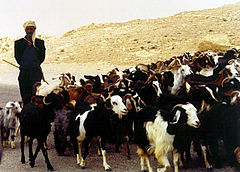| Revision as of 04:42, 29 January 2010 edit75.135.22.129 (talk) →References← Previous edit | Revision as of 14:33, 25 February 2010 edit undo162.127.121.1 (talk) →ReferencesNext edit → | ||
| Line 9: | Line 9: | ||
| ==References== | ==References== | ||
| {{Reflist}} | {{Reflist}} | ||
| I <3 JENNA!!! | |||
Revision as of 14:33, 25 February 2010
| This article relies largely or entirely on a single source. Relevant discussion may be found on the talk page. Please help improve this article by introducing citations to additional sources. Find sources: "Goatherd" – news · newspapers · books · scholar · JSTOR (May 2009) |
| This article possibly contains original research. Please improve it by verifying the claims made and adding inline citations. Statements consisting only of original research should be removed. (January 2008) (Learn how and when to remove this message) |

A goatherd (Template:Pron-en) or a goatherder is a person who herds goats as a vocational activity. Similar to a fisherman who catches fish for a living, the drover here herds goats. Goatherds are popular in countries where goat populations are significant; for instance, in Africa and South Asia. Goats are typically bred as dairy or meat animals, with some breeds being shorn for wool.
Fictional goatherds include Peter from Johanna Spyri's Heidi, and the song "The Lonely Goatherd" from The Sound of Music. Enid Blyton's novel "The Secret of Killimooin", set in the fictional but probably eastern European country of Baronia, features a blind goatherd called Beowald, who is so in tune with his environment that he can roam the mountains using his other senses, apparently unhindered by his lack of sight. The word capriculturist, which is derived from Latin, began to appear with some frequency in the late 1940s.
References
I <3 JENNA!!!